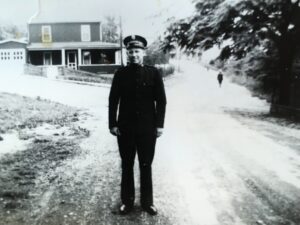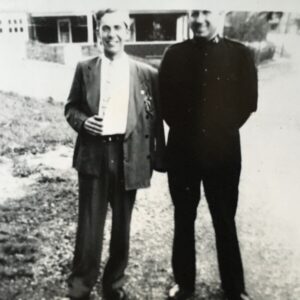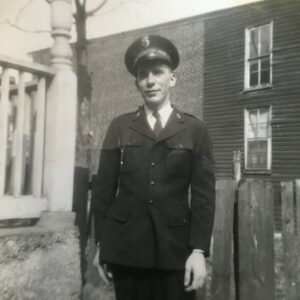In 1945, thirteen-year-old Bobby and his friends wandered down the railroad tracks, looking to hop covertly on a slow-moving train heading across town. The band of misfits typically occupied their time throwing rocks at windows, nicking items from a backyard, taking the train to avoid apprehension, and occasionally less nefarious endeavors. Coming of age at the end of the Second World War, they witnessed the defeat of fascism in Europe, yet in America, other tyrannies, like poverty, unemployment, and alcoholism, persisted. When not making trouble in sleepy Martinsburg, WV, Bobby could at times be found visiting bars in the Shenandoah Valley in search of his dad, an alcoholic, to bring him home. A chance encounter with a Salvation Army officer at the train tracks one day would change the course of Bobby’s life.
Then-Captain Melvin Jewett met Bobby and offered him the opportunity to take pictures with The Salvation Army Martinsburg Corps camera – pictures Melvin would then develop. That kind invitation became the basis for a bourgeoning friendship and Bobby’s gateway to the church. Not long after that initial meeting, Bobby became a Christian and then a soldier (lay member) in The Salvation Army. A few years on from his enrollment as a soldier, Bobby crashed into a tree while driving down the highway, resulting in severe injuries to his legs and skull. Due to the severity of the fracture to his skull, it was not clear that Bobby would survive as he lay unconscious in the local intensive care unit. Melvin, upon hearing the news, traveled to nearby Baltimore in hopes of finding a doctor who could operate on Bobby and save his life. We do not know how many clinics he visited, but eventually, he found a doctor who pioneered reconstruction surgeries in WWII. Melvin convinced the doctor to go to Martinsburg and provide the medical care for Bobby Louden, my grandfather, that saved his life.
Of course, there are many contingencies in the above story, as in any person’s story – decisions that, if made differently, would have produced a different, even tragic outcome. Most relevant to what follows is the possibility of what might have become of Bobby had his youth pastor, Captain Melvin Jewett, chosen not to walk the tracks in Martinsburg. What might have happened had that young officer not intended to befriend the troubled young men he met there and offer them, in word and deed, the gospel? My grandfather encountered at that moment a God who cared not only for souls but for bodies also – A God whose message of holy love could be instantiated in the church’s holistic care for those at society’s margins.
Such holistic ministry is commonplace in The Salvation Army, which enshrines in its mission statement two central purposes: (1) to preach the gospel of Jesus Christ and (2) to meet human need in His name without discrimination.[1] The primary purpose of The Salvation Army is to preach the gospel and its history reflects an emphasis on revivalist preaching for both adults and children. Despite the significance of preaching to all ages in Salvationist ministry, Salvationist literature possesses a void of materials describing methods for youth hermeneutics. As a product of Salvation Army youth ministry in more ways than one, this apparent void led me to construct a method of sermon craft for youth ministry in The Salvation Army.
This process begins with a method for initial study, moves into interpretation, and continues to hermeneutical considerations and, finally, crafting the sermon. The process intentionally focuses on sermon preparation within The Salvation Army, providing a Salvationist lens for interpretation. It also delves into the intersection of preaching and a highly relevant topic for youth ministry in The Salvation Army: traumatic stress. Given its mission to meet human need, The Salvation Army prioritizes service to people experiencing poverty, especially impoverished children. In 2023 alone, The Salvation Army USA served 15,291,423 individuals, providing 8,067,161 nights of shelter, 12,256,644 tangible items (clothes, furniture, gifts, etc.), and 155,968,200 meals. 1,372,825 participants attended its youth programs. Research has shown that poverty exacerbates the challenges posed by traumatic events.[2] Therefore, given the work of The Salvation Army amongst socioeconomically disadvantaged Americans and the increased difficulty under-resourced children face surviving trauma, our process explores the connections of trauma studies and preaching for youth ministry from a Salvationist perspective. To communicate this process, I partnered with Evangeline Booth College’s School for Leadership Development to create an online youth hermeneutic course called BibleFeed.
Melvin Jewett changed my grandfather’s life and, consequently, that of my family – indeed, it is likely that I would not be alive today if not for his compassion and care. The Salvation Army’s holistic ministry motivated Captain Jewett’s remarkable kindness and holistic evangelism. His friendship created trust; the gospel gave my grandfather life. Life is still on offer in Christ through the good news – life through the saving, healing, and sanctifying work of the Holy Spirit for all, even survivors of trauma. Preaching can be one of many interventions, clinical, catechetical, and otherwise, that enable the trauma survivor to realize greater interpersonal integration.
The proclaimed word is a powerful means God uses to achieve His salvific purposes. As Mary Catherine Hilkert has said, “Depth words—the words of the poet, the preacher, the priest—affect what they signify. They are audible signs of inexpressible realities. In the end, we return to Augustine’s insight: sacraments are visible words; words are audible sacraments.”[3] In the sacramental experience of preaching, children, adolescents, and young adults, despite the heavy burdens they shoulder day-to-day, can find they are not alone. The youth minister, following in the footsteps of individuals like Captain Melvin Jewett, can follow Jesus in search of even just one lost boy or girl to save.
[1] Called to Be a Soldier: Exploring the Soldier’s Covenant (London: The Salvation Army International Headquarters, 2020), 66. [2] “Risk and Protective Factors,” Centers for Disease Control and Prevention, Violence Prevention, June 29, 2023, https://www.cdc.gov/violenceprevention/aces/riskprotectivefactors.html. [3] Mary Catherine Hilkert, Naming Grace: Preaching and the Sacramental Imagination (New York: Continuum, 1997), 192; Long, The Witness of Preaching, 17.


